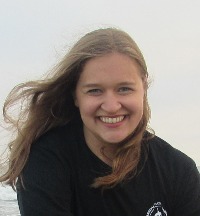
The National Science Foundation has selected two NOAA Educational Partnership Program LMRCSC scholars to join their elite Graduate Research Fellowship Program. Janelle Layton and Hillary Thalmann, both students at Oregon State University, will have the support and financial backing of the foundation as they work on their respective research projects.
Created by the United States Congress in 1950, the National Science Foundation is a federal agency dedicated to promoting the advancement of science. The foundation’s Graduate Research Fellowship Program provides support to graduate students who have proven to be outstanding in the science, technology, engineering and math fields. The educational opportunity aids graduate students in becoming experts in their studies, allowing them to make significant contributions to research and science. For over 50 years, the program has held the reputation of cultivating prestigious leaders, including former fellows who have become renowned authors, held high ranking federal positions and received Nobel prizes.
An astute scientist and individual who is intrigued by the conservation of marine fish, it is no wonder Janelle Layton was selected to become a part of the National Science Foundation’s fellowship program. The LMRCSC graduate scholar, who is pursuing her master’s degree in fisheries science, will begin her tenure with the foundation in the fall of 2022. During her time with the program, Layton will use her provided funding to continue her research on how the increasing temperature is affecting the critically endangered Nassau Grouper.
“Studies to date show an increase in mortality of larval Nassau Grouper with increasing temperatures,” stated Layton. “We have also seen an increase in variability in survival with increasing temperatures, so it is my goal to study this more in depth to help with the development of conservation and management efforts.”
The Nassau Grouper is endemic to the western Atlantic Ocean. It is a large commercially valuable fish throughout the Caribbean and generates over $1 million dollars annually from sales. Layton’s research focuses on pinpointing the impacts of increasing temperatures on the early life history stages of this critically endangered species. Layton is optimistic that her research will aid in restoring the Nassau Grouper back to thriving population numbers.

In addition to Layton earning the foundation’s opportunity, Hillary Thalmann is also a recipient of the distinguished award. In her third year of the fellowship, Thalmann’s research, focuses on Pacific Cod in the country’s northwest region. The young scientist’s research shows that the once thriving fish has declined in population numbers.
“From 2014 to 2019 there were two major heatwaves that occurred in the Pacific Ocean,” stated Thalmann. The warmer water temperatures affected the Pacific Cod population, and many eggs did not hatch.”
There have been over 150 heatwaves globally in the past 30 years, and these heatwaves adversely affect species like the Pacific Cod. Being Alaska’s second largest commercially important fish, the species’ declining numbers has greatly affected the state’s fishing industry, with smaller communities with less available fish options being hit the hardest. However, in the last few years, temperatures in the region began to go down, thus allowing the Pacific Cod to begin to thrive once again.
Layton and Thalmann’s efforts to create solutions to fishery issues that affect so many is the reason why the National Science Foundation chose them for their graduate fellowship program. The success of their research does not just benefit the science community, but it benefits many communities as a whole and adds to the quality of life of so many individuals.

